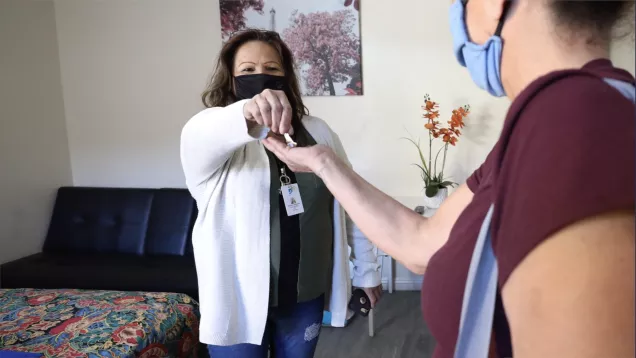
An effort to double down on the City’s financial commitment to create more affordable housing for those transitioning out of homelessness made a notable advancement today, with a unanimous endorsement by the City’s Homelessness and Poverty Committee Meeting.
The “Housing Now” Fund, proposed by Councilmember Mark Ridley-Thomas, who chairs the City’s Homelessness and Poverty Committee, and co-presented by Councilmembers Mike Bonin, Curren Price and Paul Koretz, recognizes that the City’s success in expanding effective homeless street engagement services is contingent on outreach teams being equipped with a significant infusion of resources to help transition people off the streets and into long-term supportive and affordable housing. The fund, envisioned as a collaboration between the City and County of Los Angeles, would provide rental subsidies coupled with supportive services for an additional 10,000 people experiencing homelessness, specifically targeting those with significant health and mental health needs that currently reside on City streets.
“Successful street engagement depends on having a supply of affordable and supportive housing that is readily available to place unhoused clients without delay. We need to invest in these long-term solutions, and the investment will need to be far more than what we are currently doing if we want to see a difference on our streets,” said Councilmember Ridley-Thomas. “We need to work at the scale that this crisis requires. This fund would create 10,000 new slots of permanent supportive housing using the tried and tested model of the Housing for Health Program. There is no better medicine for someone suffering from physical and mental health challenges on the street than supportive housing. Investing in rent subsidies is the right prescription.”
The Fund complements the proposed Citywide Street Engagement Strategy - the first of its kind in Los Angeles which would ensure a standardized assessment of encampments, an adequate period of dedicated street engagement at all sites where unsheltered people reside, and a transparent and accountable process by which street engagement teams work collaboratively to help unsheltered individuals transition indoors. The Strategy was advanced by the City’s Homeless and Poverty Committee earlier this month, and is anticipated to be taken up by the City’s Energy, Climate Change, Environmental Justice and River Committee next week, before it is considered by the full City Council.
The State of California’s 2021-22 Budget includes $4.8 billion in new programs that predominantly focus on building permanent housing, but to fully take advantage of these capital investment opportunities, localities will need to supply rental or operating subsidies. The Housing Now Fund would complement the State’s proposed investment in order to bring thousands more Angelinos in doors. The fund proposes a potential collaboration with the County, where the City provides the funding for the rental costs, and the County provides the supportive services to the housed clients.
Los Angeles County has experienced tremendous success with the Housing for Health model, which provides rental subsidies designed to bring more unhoused Angelinos into housing expeditiously within a variety of housing settings. “We have largely used it to leverage the existing housing market - to lease up in the private sector and to do it quickly with the housing stock that already exists,” said Interim Executive Director of the Los Angeles County Homeless Initiative, Cheri Todoroff. “It has also been used to spur the development of new housing for the developers who are doing it outside of the traditional process. As long as there is a commitment with the rental subsidy, there are some developers out there that will get their own financing and not rely on additional funding from the public sector to create permanent supportive housing.”
The “Housing Now” Initiative now moves forward for consideration by the City’s Housing Committee.
Mark Ridley-Thomas serves as Los Angeles’ City Council Chair of Homelessness and Poverty Committee and served as Co-Chair of Governor Gavin Newsom’s Homeless and Supportive Housing Advisory Task Force.